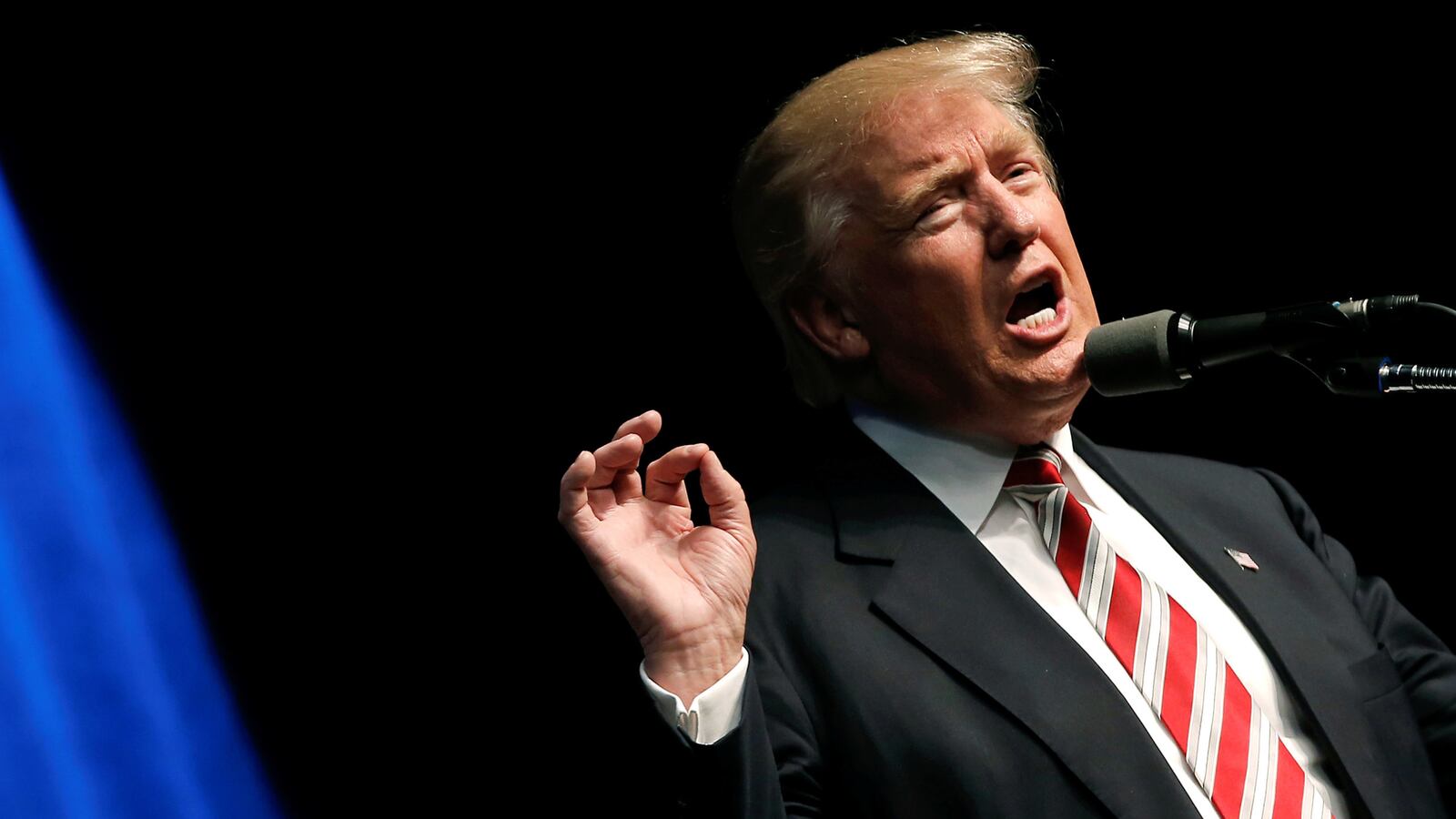Donald Trump often suggests that dogs can be fired. But who could have guessed that he would come out against safe food for all those unemployed canines?
In an official fact sheet that was pulled offline on Thursday afternoon—but not before The Hill reported its key points—the Trump campaign railed against the “FDA food police,” complaining that the agency “dictate[s] how the federal government expects farmers to produce fruits and vegetables and even dictates the nutritional content of dog food.”
The FDA does indeed regulate pet food—but that’s for good reason. Eleven of the 23 pet food recalls by the FDA since September of last year pulled chow off shelves due to food poisoned by listeria and salmonella.
Dr. Douglas Powell, a former Kansas State University food safety professor who now publishes the popular Barfblog, says the FDA’s role is key.
“Just like we regulate the nutritional content of vitamins that we add to breakfast cereal or bread, dogs also need proper nutrition,” he told The Daily Beast. “We should use science to improve the lives of not only humans but our four-legged companions.”
Paring back dog food regulations wasn’t even the most outrageous suggestion in the now-deleted fact sheet. As The Hill reported, the “FDA food police” was listed as one of many “specific regulations to be eliminated” in Trump’s economic plan. The fact sheet depicted “farm and food production hygiene,” food temperature regulations, and “inspection overkill” as cumbersome and costly safety measures that must be reviewed and potentially “scrapped.”
The Trump campaign did not immediately respond to request for comment on the “FDA Food Police” but, according to Dr. Powell, the use of the term is “patently ridiculous.”
“Regulations and the ‘food police’ are there to set minimal standards,” said Powell. “The best companies will go above and beyond those minimal standards.”
So tinkering with what are already basic preventative measures against foodborne illness, Powell says, is simply a bad idea. The FDA has already investigated 10 foodborne illness outbreaks so far this year and, according to CDC estimates, every year 48 million Americans get sick from their food and 3,000 of them die. The annual figure for foodborne illness-related hospitalizations is a whopping 128,000.
Powell predicts that if Trump were to pare back FDA regulations, most providers would still be motivated to produce safe food under threat of litigation but “you would see more people trying to cut corners.”
“Every time we have an outbreak, once you delve into the details, what you find is that it wasn’t some act of God,” Powell explained. “It was a series of small mistakes, largely driven by economics, that add up and lead to catastrophe down the road. And people die.”
In fact, Trump’s own restaurants have benefited from “inspection overkill.” In 2012, as the Associated Press reported, the steakhouse in the Trump International Hotel in Las Vegas received 51 violations “including month-old caviar and expired yogurt.” The hotel reportedly “made [adjustments] immediately” and reopened shortly thereafter.
And during an ungraded inspection of the Trump Cafe and Grill October 2015, the New York City health department found 45 violations. By the time the graded inspection came around two months later, the restaurant had reduced the number of violations to 12. Now, it serves delicious taco bowls.
Of course, as Powell explains, it is not usually the FDA itself that goes around looking for aging yogurt in Trump restaurants but rather local food inspectors who largely adhere to the FDA food code.
“[FDA food police] is a term that doesn’t mean anything but it resonates with, I guess, the people who would vote for Trump,” Powell speculated. “He’s just doing it as an anti-regulation thing. It’s not really about food safety. It’s just an easy target.”
This isn’t the first time that the FDA has been the “easy target” of an anti-regulation message. In the early 1990s, in what The New York Times editorial board would later call “an industry-financed scare campaign,” advertisements helped convince Americans to restrict the FDA’s ability to regulate vitamin and supplement labelling. The result was the 1994 Dietary Supplement Health and Education Act (DSHEA), which set up a separate set of standards for dietary supplements than for other food.
One particularly memorable 1993 TV commercial in that “scare campaign,” as Powell recalls, featured Mel Gibson’s house being raided for vitamins by a SWAT team meant to represent the FDA.
“If you don’t want to lose your vitamins, make the FDA stop,” Gibson implores at the end of the ad.
But the Trump campaign may already be rethinking its own anti-FDA stance. As The Hill reported early Thursday evening, the anti-regulation fact sheet has already been replaced with one that doesn’t specifically target the FDA. Humans and dogs everywhere can rest a little easier tonight.






